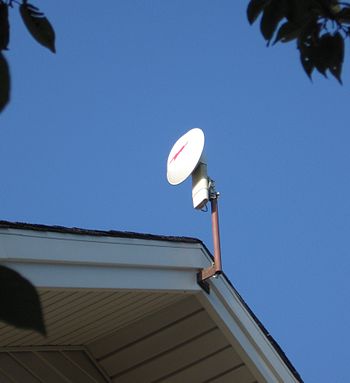By Caroline Gabriel

English: 5.2 GHz ‘Canopy’ wireless internet antenna with passive ‘Stinger’ antenna (Photo credit: Wikipedia)
Broadband wireless is a time-honored way to fill gaps in a wireline network and improve the overall economics, and emerging LTE-A Pro and 5G technologies will enhance those capabilities. Google is acquiring a US ISP called Webpass to add a wireless element to its Google Fiber platform and accelerate roll-out in some urban areas.
Until now, Google Fiber has mainly built its city networks from scratch, harnessing close relationships with municipal authorities. Webpass expands Google’s deployment options in some interesting locations – primarily Greater Miami, Chicago, Boston and several Californian cities (San Francisco, Oakland, Emeryville, Berkeley and San Diego). Google Fiber is live in Atlanta; Kansas City; Provo, Utah; Nashville, Tennesee; and Austin, Texas; and the company is working in San Francisco. It has also said Chicago and San Diego would be potential “fiber cities”, so Webpass could provide it with an earlier entry point.
Webpass was founded in 2003 and it owns and operates an Ethernet network in these areas, and so does not need to rely on telcos or MSOs for backhaul for the point-to-point wireless links that constitute the bulk of its network. It claims to have “tens of thousands” of customers, many in apartment blocks and business premises, and offers services from 100Mbps to 1Gbps.
Google Fiber has already expressed interest in combining fiber and wireless for the best balance of cost, flexibility and performance. In April it gained approval to test broadband services in the 3.5 GHz band in parts of Kansas City, where it already has a fiber network. And Eric Schmidt, chairman of Google’s holding company Alphabet, told a recent shareholder meeting: “There appear to be wireless solutions that are point-to-point that are inexpensive now because of the improvements in semiconductors; that these solutions are cheaper than digging up your garden… and can carry the gigabit performance.”







